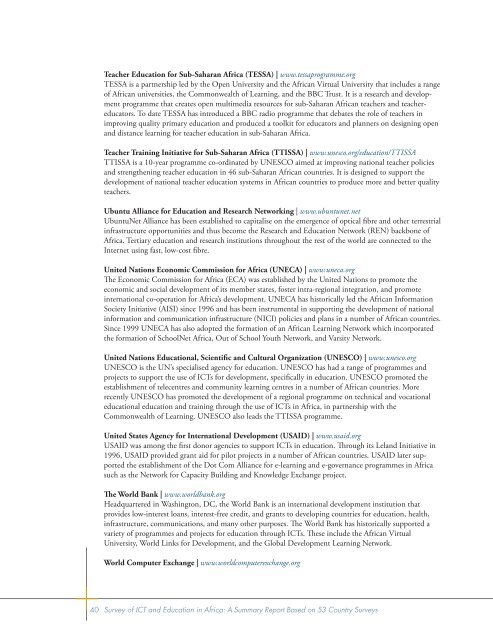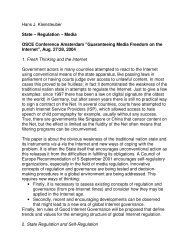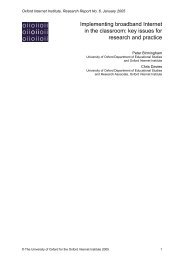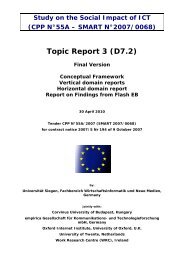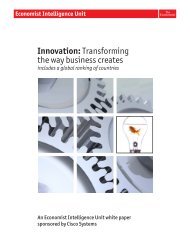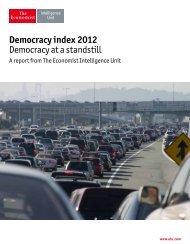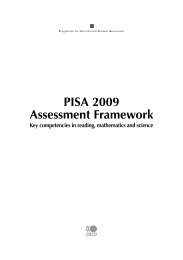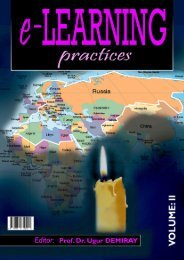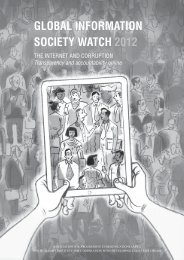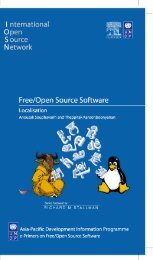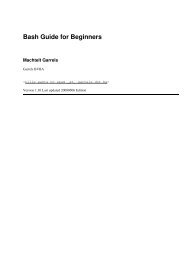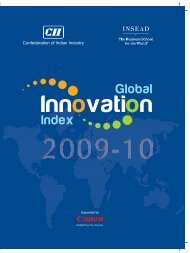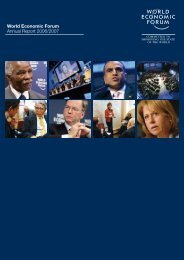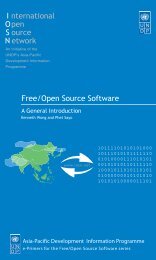LinuxChix Africa | www.africalinuxchix.orgLinuxChix Africa was formed in 2004 by a group of African women to promote the development of freeand open source software, particularly Linux skills.Microsoft | http://www.microsoft.com/education/Working closely with worldwide education communities, Microsoft has developed technology, tools,programmes, and solutions to help address education challenges while improving teaching and learningopportunities. In countries like Ghana, Kenya, and South Africa, Microsoft has promoted low-cost access tosoftware for schools. In addition, Microsoft established its Partners in Learning programme and its relatedInnovative Teachers Network which supports teacher development projects in a number of African countries.Mtandao Afrika | www.mtandao-afrika.orgFormerly known as ThinkQuest Africa, Mtandao Afrika holds a n Internet challenge contest for Africanyouth. The contest focuses on the collaborative development of educational Web sites by youth who work inmultinational teams and who are awarded prizes by a panel of international judges.NEPAD e-Schools | www.eafricacommission.orgThis initiative aims to impart <strong>ICT</strong> skills to young Africans in primary and secondary schools as well asharness <strong>ICT</strong> technology to improve, enrich, and expand education in African countries. The aim is to equipall African primary and secondary schools with <strong>ICT</strong> apparatus such as computers, radio and television sets,phones and fax machines, communication equipment, scanners, digital cameras, and copiers, and to connectthem to the Internet. Each school will be equipped with a “health point.” which encourages the use of theschools’ <strong>ICT</strong> resources by the broader community. NEPAD e-Schools is currently concluding its first Demoproject which involved 16 African country governments collaborating with five consortia companies in theprovision of <strong>ICT</strong> resources to six schools in each of the 16 countries.One Laptop per Child (OLPC) | www.laptop.org or www.olpc.comOLPC is a non-profit organisation set up to promote a low-cost laptop, known as the “$100 laptop,” in anattempt to promote access to the technology to the world’s children to support their learning. To dateinterest has been expressed by governments in Libya, Nigeria, and Rwanda.Panafrican Research Agenda on the Pedagogical Integration of Information and CommunicationsTechnologies (<strong>ICT</strong>) | www.observatoiretic.org/A knowledge network, initiated by the International Development Research Centre (IDRC), bringingtogether partners in eleven African countries to help researchers, practitioners, and institutions to collect andshare data.Peace Corps | www.peacecorps.govPeace Corps is an organisation based in the US that encourages US citizens to volunteer their time to workin developing countries in areas such as HIV/AIDS, information technology, and business development. Inthe <strong>ICT</strong> for education sector, Peace Corp volunteers have been stationed in a number of African countries toassist with the provision of technical training and support to groups and organisations that use <strong>ICT</strong>s ineducation.Schoolnet Africa | www.schoolnetafrica.netSchoolNet Africa is an NGO-based in Senegal that promotes education through the use of <strong>ICT</strong>s in Africanschools. SchoolNet Africa functions as a network of schoolnet organisations operating in 33 countries on thebasis of regional programmes on <strong>ICT</strong> access, teacher training, and collaborative learning. To date SchoolNetAfrica has produced a range of research reports on the experiences of African countries on the use of <strong>ICT</strong>s inschools.www.infodev.org ANNEX 1: Regional <strong>ICT</strong> in Education Initiatives in Africa 39
Teacher Education for Sub-Saharan Africa (TESSA) | www.tessaprogramme.orgTESSA is a partnership led by the Open University and the African Virtual University that includes a rangeof African universities, the Commonwealth of Learning, and the BBC Trust. It is a research and developmentprogramme that creates open multimedia resources for sub-Saharan African teachers and teachereducators.To date TESSA has introduced a BBC radio programme that debates the role of teachers inimproving quality primary education and produced a toolkit for educators and planners on designing openand distance learning for teacher education in sub-Saharan Africa.Teacher Training Initiative for Sub-Saharan Africa (TTISSA) | www.unesco.org/education/TTISSATTISSA is a 10-year programme co-ordinated by UNESCO aimed at improving national teacher policiesand strengthening teacher education in 46 sub-Saharan African countries. It is designed to support thedevelopment of national teacher education systems in African countries to produce more and better qualityteachers.Ubuntu Alliance for Education and Research Networking | www.ubuntunet.netUbuntuNet Alliance has been established to capitalise on the emergence of optical fibre and other terrestrialinfrastructure opportunities and thus become the Research and Education Network (REN) backbone ofAfrica. Tertiary education and research institutions throughout the rest of the world are connected to theInternet using fast, low-cost fibre.United Nations Economic Commission for Africa (UNECA) | www.uneca.orgThe Economic Commission for Africa (ECA) was established by the United Nations to promote theeconomic and social development of its member states, foster intra-regional integration, and promoteinternational co-operation for Africa’s development. UNECA has historically led the African InformationSociety Initiative (AISI) since 1996 and has been instrumental in supporting the development of nationalinformation and communication infrastructure (NICI) policies and plans in a number of African countries.Since 1999 UNECA has also adopted the formation of an African Learning Network which incorporatedthe formation of SchoolNet Africa, Out of School Youth Network, and Varsity Network.United Nations Educational, Scientific and Cultural Organization (UNESCO) | www.unesco.orgUNESCO is the UN’s specialised agency for education. UNESCO has had a range of programmes andprojects to support the use of <strong>ICT</strong>s for development, specifically in education. UNESCO promoted theestablishment of telecentres and community learning centres in a number of African countries. Morerecently UNESCO has promoted the development of a regional programme on technical and vocationaleducational education and training through the use of <strong>ICT</strong>s in Africa, in partnership with theCommonwealth of Learning. UNESCO also leads the TTISSA programme.United States Agency for International Development (USAID) | www.usaid.orgUSAID was among the first donor agencies to support <strong>ICT</strong>s in education. Through its Leland Initiative in1996, USAID provided grant aid for pilot projects in a number of African countries. USAID later supportedthe establishment of the Dot Com Alliance for e-learning and e-governance programmes in Africasuch as the Network for Capacity Building and Knowledge Exchange project.The World Bank | www.worldbank.orgHeadquartered in Washington, DC, the World Bank is an international development institution thatprovides low-interest loans, interest-free credit, and grants to developing countries for education, health,infrastructure, communications, and many other purposes. The World Bank has historically supported avariety of programmes and projects for education through <strong>ICT</strong>s. These include the African VirtualUniversity, World Links for Development, and the Global Development Learning Network.World Computer Exchange | www.worldcomputerexchange.org40Survey of <strong>ICT</strong> and Education in Africa: A Summary Report Based on 53 Country Surveys
- Page 1: + MAINSTREAMING ICT and Education S
- Page 5 and 6: Infrastructure in Schools 11Infrast
- Page 7 and 8: larger, on-going, systematic, coord
- Page 10 and 11: Project BackgroundOverviewThis repo
- Page 12: Mary Mmayi, Philip Ouma Ayoo; Dlang
- Page 16 and 17: DANTE (Delivery of Advanced Network
- Page 21 and 22: nnnnand South Africa, have mechanis
- Page 23 and 24: countries. In addition, a very limi
- Page 25 and 26: nMauritius uses a fleet of “cyber
- Page 27 and 28: nnnnnnInstitutional policy developm
- Page 30 and 31: ICT Activities and Initiativesin Pr
- Page 32 and 33: nnnnnnsourced second-hand and refur
- Page 34 and 35: use of ICTs in teaching and learnin
- Page 36 and 37: ICT Activities and Initiativesin No
- Page 38 and 39: Gender Equity and ICTin EducationGe
- Page 40 and 41: Factors Enabling andCONSTRAINING IC
- Page 42 and 43: ICT in Education inAFRICA: A Way Fo
- Page 44 and 45: Notes1. Steiner, R., T. Nyaska, M.
- Page 46 and 47: ANNEXESwww.infodev.org Notes 33
- Page 48 and 49: ANNEX 1:Regional ICT in EducationIn
- Page 50 and 51: prises in Africa and the developing
- Page 54: Headquartered in the US, the WCE so
- Page 57 and 58: This book chronicles and analyses t
- Page 59 and 60: “Mozambique ICT4D National Policy
- Page 61 and 62: 3. Primary and Secondary EducationA
- Page 63 and 64: “Intel Gives Nigerian Students Ac
- Page 65 and 66: 4. Tertiary Education“AAU Newslet
- Page 67 and 68: www.aau.org/wghe/publications/wghe_
- Page 69 and 70: An EDC pilot project to build the c
- Page 71: COUNTRIES/AFRICAEXT/EXTAFRREGTOPEDU
- Page 74: SURVEY OF ICT AND EDUCATION IN AFRI


